If your heart was like mine: Cold Mountain poems
Cold Mountain poems
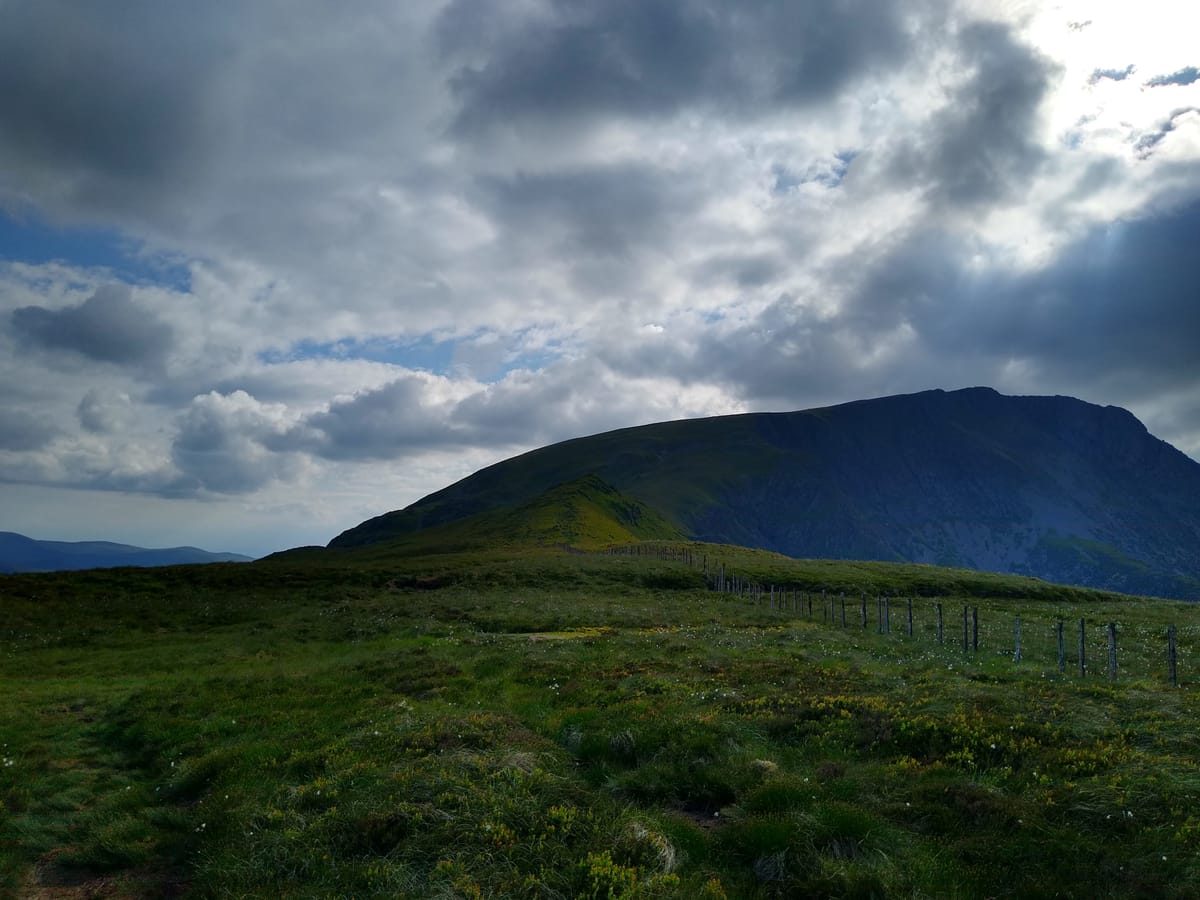
Men ask the way to Cold Mountain
Cold Mountain: there’s no through trail.
In summer, ice doesn’t melt
The rising sun blurs in swirling fog.
How did I make it?
My heart’s not the same as yours.
If your heart was like mine
You’d get it and be right here.
- Han Shan - date unknown, possibly 7th century
Poems often encourage a blurring between poet and reader. Poets invite us to identify ourselves with them: to feel what they feel, to share their hearts, to look upon the world with their eyes. This fusion of selves, this empathy that can reach out across continents and centuries, is part of the mystical power of poetry. But Han Shan is having none of it. There’s a refreshing bluntness about a poem that won’t let us get away with wallowing about in a soup of indistinct persons:
My heart’s not the same as yours.
If your heart was like mine
You’d get it and be right here.
My heart—mine—is not the same as yours. Take a good look at me, Han Shan tells the reader, and then take a look at yourself. You’ve got a long way to go.
A mysterious figure, Han Shan (‘Cold Mountain’—the name he shared with the place he made his home) appears to have been a poet and hermit living in southeastern China in either the Sui or early Tang Dynasty. Over 300 short poems survive in a collection said to have been assembled from verses he had left written on bamboo, wood, stones, cliffs, and the walls of people’s houses. They tell of blissful seclusion, of hardship cheerfully endured, a simple life in the harsh wilderness; of indifference to the mockery of his fellow men, and the cares of wealth and worldly status long renounced.
‘There are old people who knew him,’ says an introduction to an early anthology of his poems: ‘they say he was a poor man, a crazy character.’ He would turn up occasionally at the nearest monastery to pilfer food from the kitchens; then he marched off shouting and laughing to himself. When the monks caught him and beat him or insulted him, he clapped his hands and laughed uproariously, then walked away. When an important official tried to send him presents, he saw the messenger approaching and yelled, ‘Thief! Thief!’ and retreated into his cave. A final shout: ‘I tell you man, strive hard!’ and the cave seals itself behind him; with those words, echoing the last words of the Buddha himself, Han Shan disappears altogether.
He’s a good companion for hillwalking, and he was on my mind a while ago during a trip hiking and camping in the Welsh mountains.
In a tangle of cliffs I chose a place—
Bird-paths, but no trails for men.
What’s beyond the yard?
White clouds clinging to vague rocks.
Now I’ve lived here—how many years—
Again and again, spring and winter pass.
Go tell families with silverware and cars,
‘What’s the use of all that noise and money?’
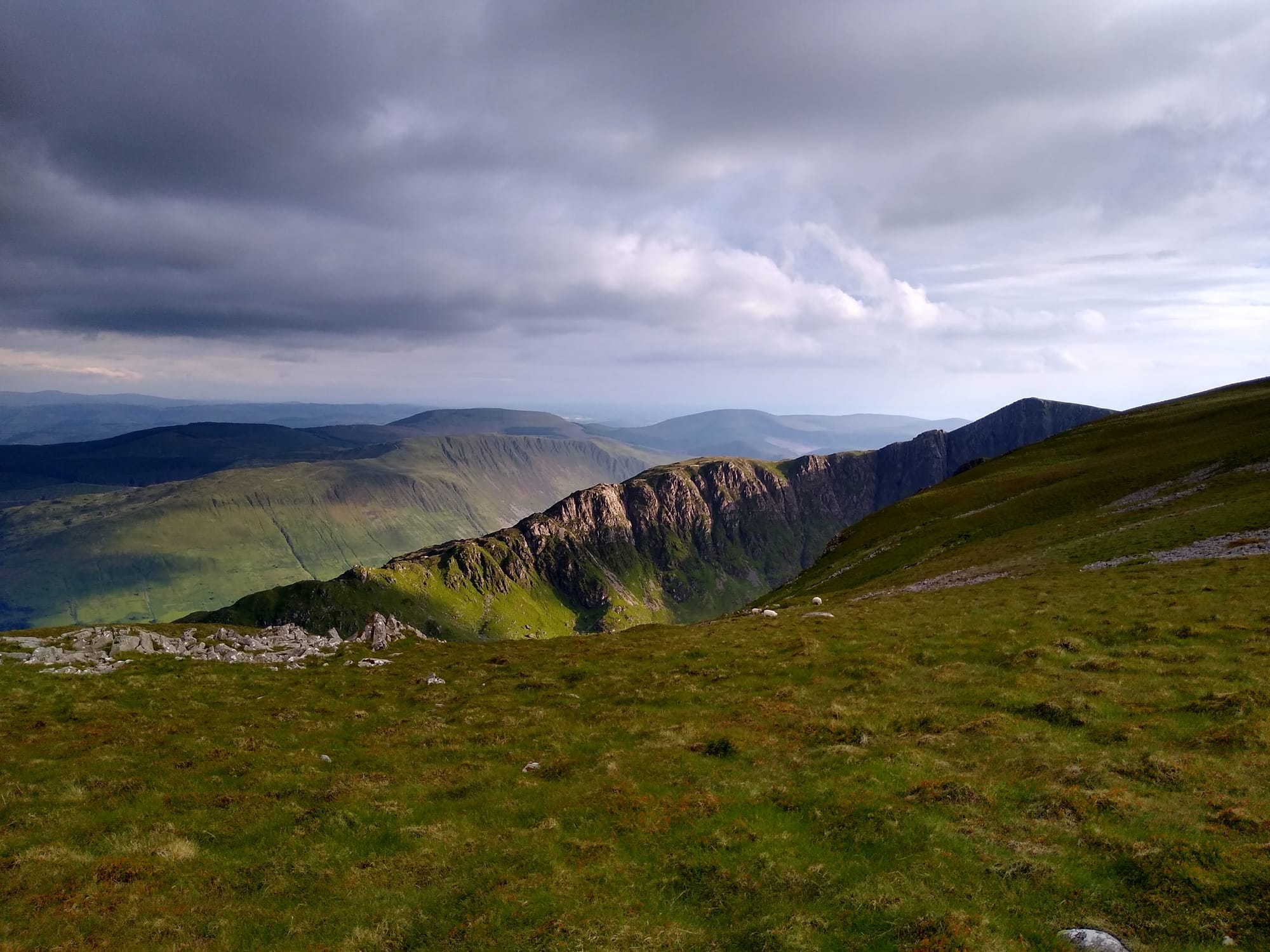
In poem after poem, the rugged, unpeopled landscape of Cold Mountain is summoned with extraordinary clarity and economy.
A thousand grasses bend with dew,
A hill of pines hums in the wind.
or, elsewhere,
The long gorge choked with scree and boulders,
The wide creek, the mist blurred grass.
or again:
When the moon shines, water sparkles clear
When the wind blows, grass swishes and rattles.
I’ve never seen Mount Tiantai in Zhejiang Province, where Han Shan lived, but walking by ‘rivers through deep green grass’ or among ‘jumbled cliffs—unbelievably rugged’, where ‘white clouds gather and billow’, or looking over ‘woods in the dark ravines spitting mist’, the hills of Snowdonia offered no shortage of reminders of the Cold Mountain poems, and wherever I went there seemed to be a Han Shan line to match my surroundings.
The landscapes of Cold Mountain reveal more than just the beauty of nature. Han Shan’s solitude on the mountain is the setting for an extraordinary spiritual achievement: a life lived in accordance with the ideas that were then developing in China from the fusion of recently arrived Mahayana Buddhism with the long-established Daoist tradition, and which would eventually come to be known in the West by the Japanese name of Zen. Alone in his cave or his bare hut, Han Shan has arrived at complete detachment from the unnecessary hang-ups and materialistic trappings of society; though ordinary people think him eccentric to the point of craziness, he is at one with himself and his emotions, spontaneous, aware of himself and his surroundings, perfectly free.
All of this makes him all the more appealing as a hiking partner. Armed with a few of the Cold Mountain poems, a recreational activity becomes a spiritual journey. ‘Clambering up the Cold Mountain Path, / The Cold Mountain trail goes on and on: … Who can leap the world’s ties / and sit with me among the white clouds?’ If I can tap into a bit of Han Shan, something that might otherwise just be a hobby is adorned with grand delusions of a greater purpose, a purifying ascent to new heights of consciousness.
Han Shan took on great significance, too, for Gary Snyder, the poet whose translations I have been quoting. Snyder’s own poetry fuses his Zen practice with his intimate knowledge of the forests and peaks of the American West; mountain settings appear constantly in his work, and like Han Shan, while he does include explicit Buddhist references, he’s often at his most powerful when he leaves things unsaid. This, from his first published collection of his own poems:
Mid-August at Sourdough Mountain Lookout
Down valley a smoke haze
Three days heat after five days rain
Pitch glows on the fir-cones
Across rocks and meadows
Swarms of new flies.
I cannot remember things I once read
A few friends, but they are in cities.
Drinking cold snow-water from a tin cup
Looking down for miles
Through high still air.
Or this, decades later:
On Climbing the Sierra Matterhorn Again After Thirty-one Years
Range after range of mountains
Year after year after year.
I am still in love.
4.X.40086, On the summit
As an antidote to anxious, self-obsessed urban life, filled with complications and stress and craving and overconsumption, both mountain poets have an enduring appeal.
I had read that if I spent the night on the slopes of Cadair Idris, I would wake up either a madman or a poet. Making camp by a mountain lake lying just below the summit, I wondered which it was to be: or whether I might end up like Han Shan, who was to all intents and purposes both.
The Cadair Idris legend doesn’t say how the outcome is determined, but often we make our own luck. By the time I emerged from a dip in the lake, the temperature was falling fast under a clear sky, and I began to worry I might have loaded the dice unfavourably by forgetting my sleeping bag. A few hours later, as gusts of winds whipped cold spray from the rippling waters of the lake, and the poncho I had strung up as a shelter blew away for the third time, I huddled into a ball, losing track of time and place in a vaguely hallucinatory half-sleep, and I could only assume that the Muse of Poetry was watching the game slip away from her.
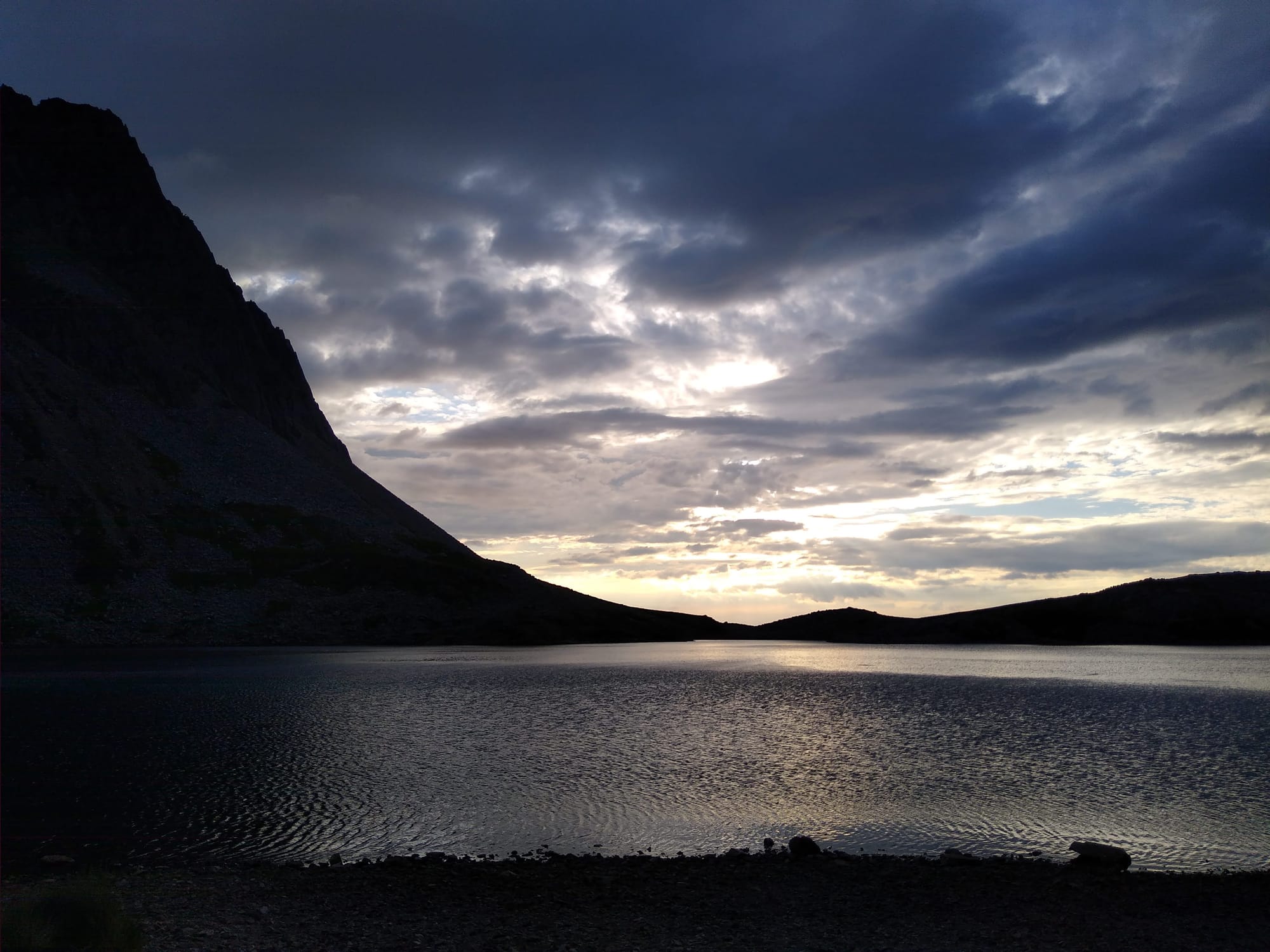
In a 1990 essay, Snyder wrote that ‘The etiquette of the wild world requires not only generosity but a good-humoured toughness that cheerfully tolerates discomfort,’ or in Han Shan’s words:
Thin grass does for a mattress,
The blue sky makes a good quilt.
Happy with a stone under head
Let heaven and earth go about their changes.
It started to become clear to me then how deceptive the simplicity of the Han Shan poems could be. ‘The blue sky makes a good quilt’: the assertion is so disarmingly straightforward that you’re almost convinced. It’s only when you bed down on the mountain without a sleeping bag that you really understand what Han Shan is telling us. For most of us, on a cold night, the sky makes a pretty shitty quilt, and being ‘happy with a stone under head’ is much easier said than done.
That is to say: you don’t become as rugged and indestructible as Han Shan just by reading one of his poems, and to realise this—not just in the intellect, but in shivering limbs and chilled bones—is to learn one of the things that the early Zen masters were at pains to teach. There are no short cuts on the spiritual journey either.
Jack Kerouac found much the same thing when he went mountain climbing with Gary Snyder. In The Dharma Bums, a thinly fictionalised account of his friendship with Snyder, the two of them go up the Sierra Matterhorn, swapping improvised haiku all the way up. A tough and experienced mountaineer, the Gary Snyder character makes it to the top, but Ray Smith, Kerouac’s alter ego, loses his nerve just below the summit and ends up huddled on a ledge yelling at his companion over and over again, ‘“This is too high!”’
Han Shan appears throughout Kerouac’s book as a kind of patron saint for the wild young men around whom the narrative revolves, enthusiastically embracing a new American Buddhism at the birth of the counterculture movement. The end of the book draws on the two months Kerouac spent alone as a fire lookout on Desolation Peak, at Snyder’s urging, living alone in a bare hut and trying to identify himself with the hermit of Cold Mountain. But even here enlightenment doesn’t come easily. In the novel he has a kind of vision of Han Shan fused with Snyder, but “he stood there saying nothin’.” A poem from the notebook Kerouac kept that summer:
I called Hanshan
in the mountains
—there was no answer
‘If your heart was like mine, you’d get it and be right here.’ Kerouac, I suspect, had some discouraging insights of his own into the implacable separation between two persons, and two hearts.
The Dharma Bums documents moments of sublime spiritual awakening, but turning transcendental insights into a settled form of life proved beyond Kerouac, and he was dead at 47 from cirrhosis, compounded by injuries sustained in a bar fight. And if the sexual exploits described in the novel have any basis in fact, Snyder seems to have been far from perfect himself. It’s one thing to climb the mountain; it’s another to stay up there. So what about Cold Mountain himself: surely he ‘made it’?
It’s hard to say for sure. Pick at the Cold Mountain legend and it begins to unravel. There are no reliable accounts of Han Shan’s life, and no contemporary references at all. The colourful story of the crazy reprobate hanging around the monastery kitchen for scraps claims to be authored by a senior government official who almost certainly never existed; it was probably made up hundreds of years later. Studies of the rhyming and content of the poems themselves suggest that there at least two distinct literary styles at work, and there might have been as many as three different poets, separated by two or three centuries, whose work was merged into a single collection under the name of Han Shan.
It doesn’t mean there never was a hermit on Cold Mountain, only that we can’t be sure of anything about his life. Perhaps it doesn’t matter how real Han Shan was: what’s important isn’t the historical figure but the idea he represents. We’ll never know for sure if there’s anyone at the top of the mountain; not unless we get there ourselves. We keep climbing anyway.
I didn’t wake on Cadair Idris filled with poetic inspiration. Perhaps not completely mad, either, but after another two days of walking I did feel my mental state beginning to shift. By then I had reached the rocky northern section of the Rhinogydd, a fairly low but unforgiving spine of hills on the western edge of Snowdonia. With the wrong map and the wrong kit and the wrong assessment of how unfit I had become, exhaustion was setting in. Twelve hours on the trail every day, cold sleepless nights, constant complaints from the soles of feet grown soft and tender, all these things took their toll, and scrambling up one of the lesser summits of Moel Ysgyfarnogod I found myself in a sort of feverish delirium.
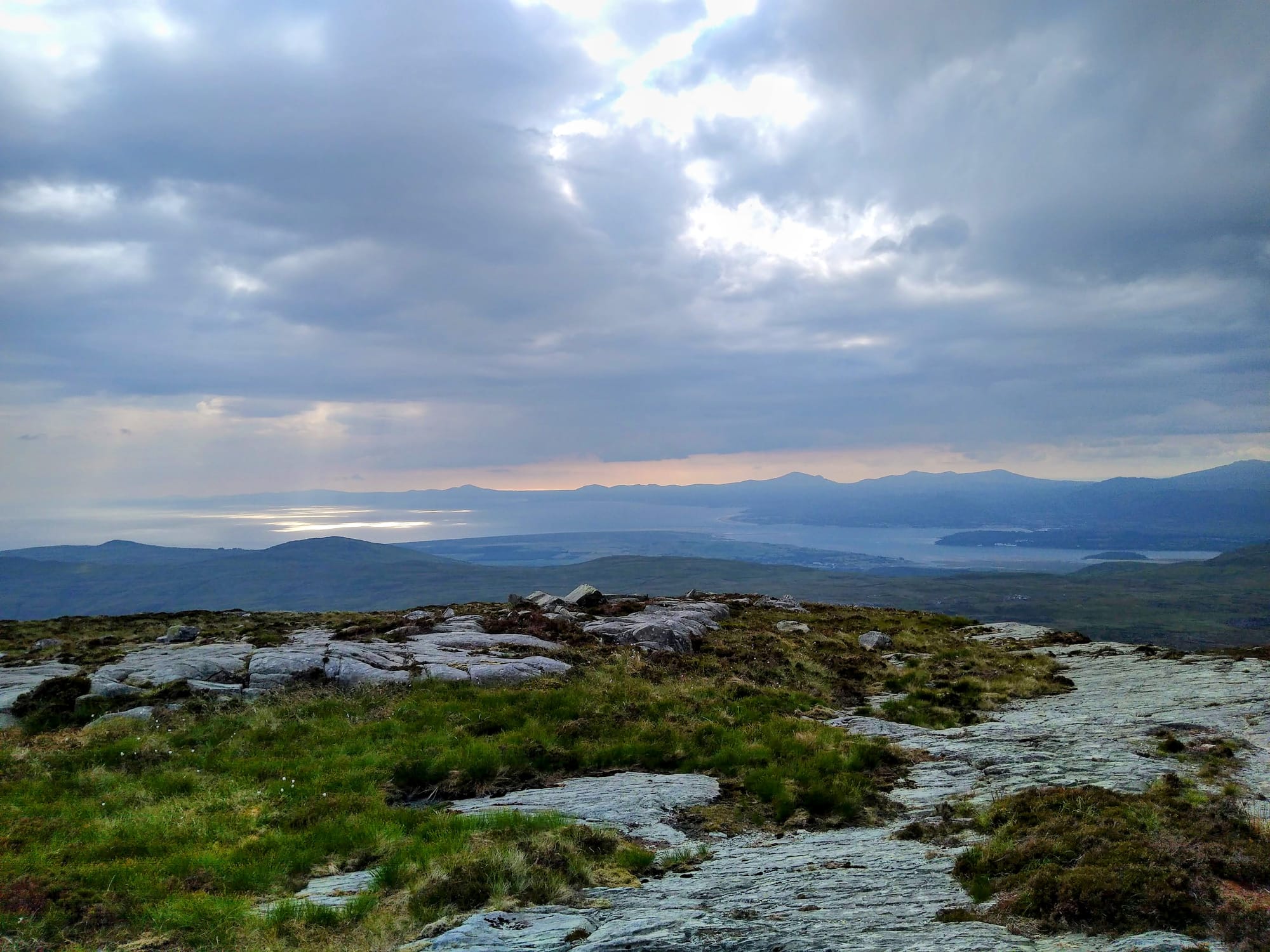
At least in the memory, the landscape I saw when I reached the top has taken on an unearthly, false-colour palette, like an artist’s rendering of another planet. Gone were the muted colours of the limestone and mugwort and pine of Han Shan’s verse, and of Chinese landscape painting. What I remember instead is a shattered chaos of toxic purples and hideous acid greens, and dark slime oozing over cold metallic rock; geology turned into tormented archaeology, so that the cliffs and terraces and table-top summits seemed to be the ruins of a titanic city raised and destroyed by unfathomable powers, and concentric curves of stone below me on the plateau were an arena for some horrible ancient combat. Distances became distorted; the Aztec ziggurat that was the sister peak of Foel Pendau, a mile and half away, seemed close enough to touch, while ditches yawned into ravines a quarter-mile across, and rock terraces that looked a few feet high reared up far above my head when I approached them. The mountains were no longer mountains; they had become terrible and strange. On another day I might have been struck with the beauty of the place: instead, it had taken on the dimension of a nightmare. But just the other side of that unsettled state lay an unusual clarity.
Slowly, painfully, I found a way across the trackless jumble of rock and bog, and reached a lake just below the main summit of the mountain. In the shallows, a sheep floated dead on its side, its eye bloated shut, just one tufted ear and a dome of clean white fleece rising clear of the water. I felt an unexpected urge to go and touch it. I approached, and looked down on it from the steep bank. There was something very peaceful about the ripples lapping gently at the soaked wool, a few minnows below the surface darting at it experimentally. I looked up to see the setting sun framed by a narrow gap in the rocks to the north-west. A ewe was making her own way along the lakeside track away from me; her lamb trotted beside her. The wind had dropped, and I heard a lone bird singing. I had no visions of Han Shan, but as I left that place and the cloud closed over me, I had a different visitation. Above me, a black plastic bag was tumbling in the empty sky. It found me, alone on the vast shoulder of the mountain, danced in the air for me a while, and when I reached out it came to rest on my outstretched hand.
It’s a city-dweller’s mistake to think of ‘nature’ as being only the pristine, pretty bits. As Snyder has written: ‘Life in the wild is not just eating berries in the sunlight. … [T]here is a world of nature on the decay side, a world of beings who do rot and decay in the shade. Human beings have made much of purity and are repelled by blood, pollution, putrefaction. The other side of the “sacred” is the sight of your beloved in the underworld, dripping with maggots.’ I had stood on a mountaintop, looked out at what must have been a magnificent view, and could only see the world as alien and threatening, could only feel pain and the cold wind. It was the carcass of a drowned sheep and a piece of wind-tossed litter that brought me back to a grateful appreciation of the world around me.
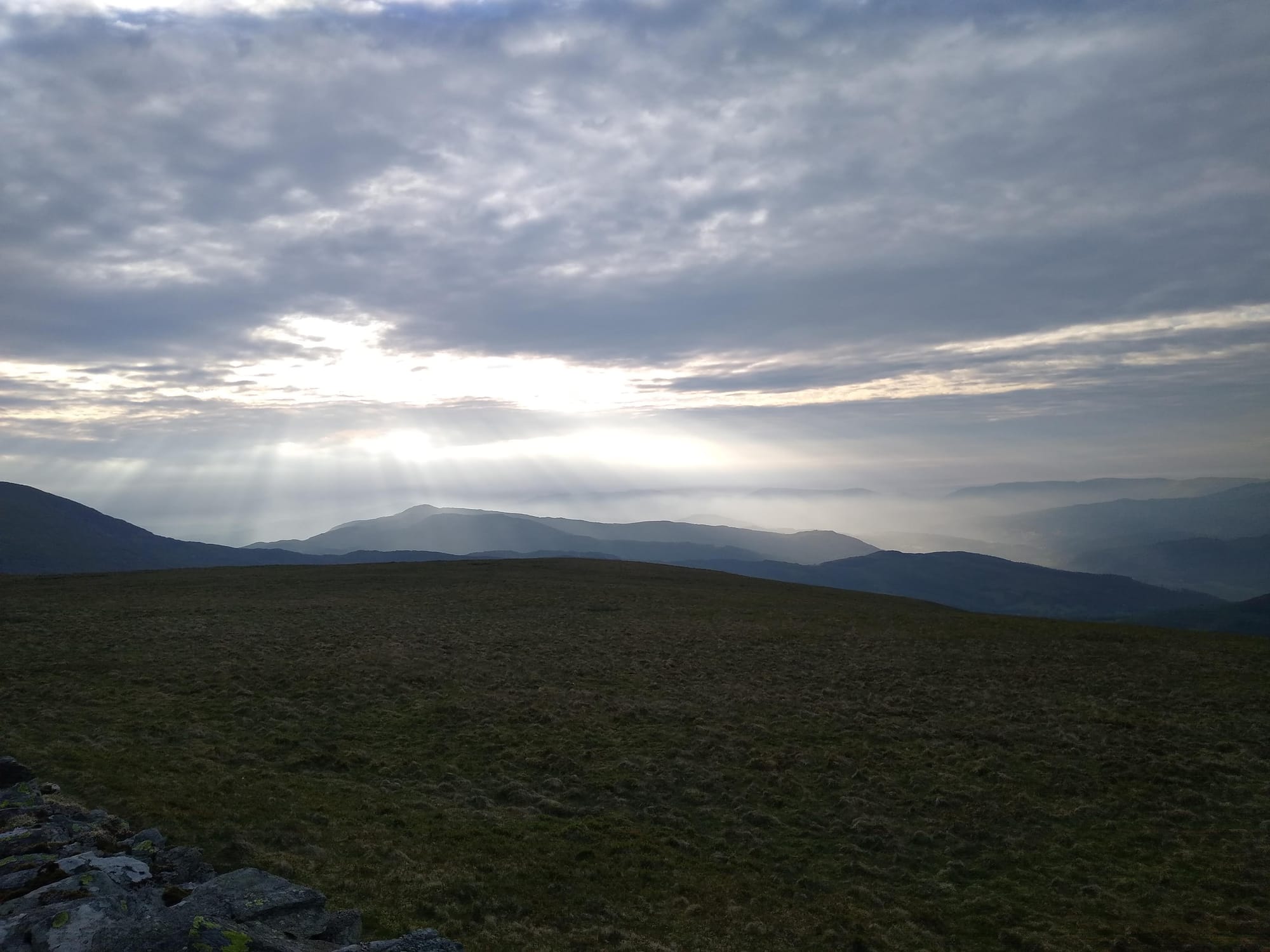
The state of mind wouldn’t last, but I had a brief sense that everything was, on some very deep and important level, all right, and I felt that at that moment I knew something it was a privilege to know. These moments, when we have them, are transient, but even when life has moved on, the memory of them can serve as a reminder of something less changeable. My heart’s not the same as yours: but the specific images of a poem can stand for a universal idea; one moment can stand for a lifetime; one crazy hermit can stand for the whole of humanity.
A final ascent of Foel Pendau, a long slog down over heather as night fell, and on the pasture land below I brushed aside the sheep droppings—‘Thin grass does for a mattress’—to bed down in the lee of a drystone wall. I boiled up some noodles, brushed uselessly at the biting clouds of midges, and fell into exhausted sleep. The next morning I felt feverish again; I knew I couldn’t go much further. My insides were churning, too; I had pressing needs, no chance of reaching a toilet, no trowel even to dig a hole with. After a moment of panic I remembered with joy the airborne thing that had come to me like a gift the night before, and a few hours later I stumbled into the nearest village clutching a bag of my own shit. If anyone had accosted me, I wonder if I would have clapped my hands and danced and laughed at them.
All I can say to those I meet:
“Try and make it to Cold Mountain.”
Notes:
This is a revised version of a longer essay first published at The Signal House Edition in October 2021, perfectly paired with photographs from Mount Wutai by Henry Hu. I have revisited it here because I have been rereading the Gary Snyder Han Shan poems recently, and because it gives some context for the title of this blog.
Han Shan translations are all by Gary Snyder, from his 1959 collection Riprap and Cold Mountain Poems. The Snyder essays quoted are ‘The Etiquette of the Wild’, and ‘Blue Mountains Constantly Walking’, both in The Practice of the Wild (1990). Kerouac’s haiku is No. 57 from Desolation Pops, in his posthumous Book of Haikus (2004).
[Note: these links are to Bookshop.org: I earn a 10% commission from any sales using these links, with a matching 10% going to support independent bookshops.]
Photographs in this version are my own.